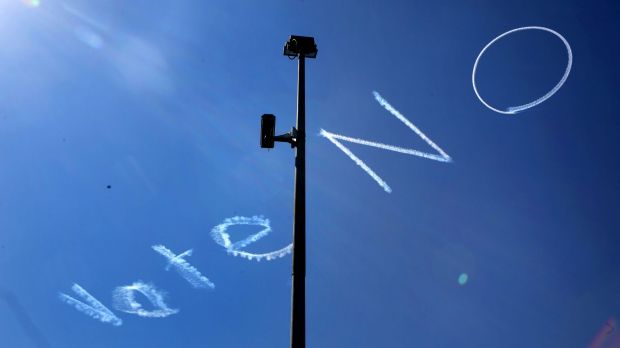It recently came to light that the Anglican Diocese of Sydney had donated a million Australian dollars (~$780,000 US) to the “NO” campaign in Australia’s debate over marriage equality. News of the donation though, has created some blowback for the diocese.
Anglicare Australia, a network of Anglican relief and development agencies associated with the Anglican Church in Australia got caught up in the issue with enough people thinking that the charity organization was supporting the “NO” campaign that it felt compelled to issue a statement via Twitter.
1/3 Anglicare Australia hasn’t donated to the ‘No’ campaign and we weren’t a party to the Sydney’s Diocese’s decision to make a donation
— Anglicare Australia (@anglicare_aust) October 11, 2017
2/3 We completely understand why news of the Sydney Diocese donation has caused real and deep hurt and anger
— Anglicare Australia (@anglicare_aust) October 11, 2017
3/3 Anglicare’s staff and volunteers work to help people. We hope those in need won’t be deterred from seeking help with an Anglicare agency
— Anglicare Australia (@anglicare_aust) October 11, 2017
There was also dissent from within the diocese according to Christian Today;
Rev Dave Smith, parish priest at Holy Trinity in Dulwich Hill, said he was ‘shattered’ by the decision. ‘I think there’s a degree of shock [among the congregation]. I think they are taking it pretty hard,’ he said according to the Sydney Morning Herald.
Father Andrew Sempell of St James’ said he was ‘surprised’ by the announcement ‘There was no consultation, there was no open debate – and therefore no transparency in the decision,’ he told Fairfax Media.
‘We haven’t let go of Christendom all that much. We still think that we have a right to tell people what to do. This is one of the reasons we’re on the nose.’
He accused the diocese of poor financial management in the past, saying ‘they did everything wrong that you could possibly do’, adding: ‘Which sort of begs the question: why are they throwing money around like this?’
Even conservative ministers who back the ‘no’ campaign criticised the scale of the donation.
Rev Michael Paget of St Barnabas on Broadway described the donation as ‘out of proportion’ amounting to ‘poor financial stewardship’ and was close to ‘indefensible’.
Melbourne journalist and author Dr Muriel Porter, who has served on the Anglican Church of Australia’s national General Synod for 30 years, said she was ‘not surprised, but I am shocked’ by the donation, describing it as ‘an extraordinary use of church money’.
‘People will just think, for heaven’s sake, that they are out of touch,’ she told Buzzfeed. ‘It’s the way the church has treated women. The Anglican Church’s opposition to the full equality of women; their decades-long opposition to divorce and remarriage. That did huge damage to people.
‘It hadn’t just been the sex abuse crisis that damaged the churches, it’s their attitudes to ordinary people and their ordinary lives.’
Archbishop Glenn Davies though has sloughed off the criticism in a letter to the diocese. He defended the donation not only in terms of their stance against marriage equality but positing it as a defense of freedom generally.
I consider the consequences of removing gender from the marriage construct will have irreparable consequences for our society, for our freedom of speech, our freedom of conscience and freedom of religion. It is disingenuous to think otherwise, given the evidence to the contrary in Canada, the US and the UK.
In an extension of his defense-of-freedom argument, he raised the specter of having persons antithetical to Christ take over the church’s work, ultimately forcing a choice between subservience to the state or to Christian witness. He alluded to examples from other nation’s experiences without giving concrete details.
Some have questioned whether the money would have been better spent on social justice issues (feeding the poor, Sydney’s homeless, refugees etc.). The reality is, however, that our participation in the Coalition for Marriage is not at the expense of our commitment to social justice, but because of it. We believe that the best way for Anglicare and other Christian agencies to serve the social good is for them to be able to operate on the basis of a Christian ethos, and to recruit Christian staff and volunteers. A legal recognition of same-sex marriage will significantly affect Anglican bodies who wish to maintain and promote a Christian understanding of marriage in opposition to the law of the land. Overseas experience indicates that same-sex marriage leads to government funding and recognition of charitable status being increasingly tied to “equality compliance”. Christian agencies overseas have been required by law to hire staff who do not support the Christian ethos of the organisation. Our Anglican bodies make a real difference to Australian lives, worth hundreds of millions of dollars. Compare that with an investment of just one million dollars to help ensure that this vital work continues in the future.
The debate in Australia has become very heated with passions running hot and the Archbishop also said rather than accepting equality, the church should stand with those reactionary elements in the country to the bitter end and if equality should come, then they would be in a better position to carve out exemptions for themselves.
I know that some of us take the view that same-sex marriage is inevitable and have questioned whether spending this amount of money was a waste of our resources. This is misguided on two counts. Firstly, because the result is by no means certain. The latest figures from the ABS indicate that only 62.5% of Australians have returned their postal surveys, meaning that 37.5% of people have not yet voted. The outcome literally hangs in the balance. Opinion polls have been notoriously inaccurate. Secondly, even if the ‘no’ vote does not prevail, the diocesan contribution came at a critical moment which allowed the ‘no’ campaign to raise awareness of the consequences of same-sex marriage for freedom of speech and freedom of religion.

